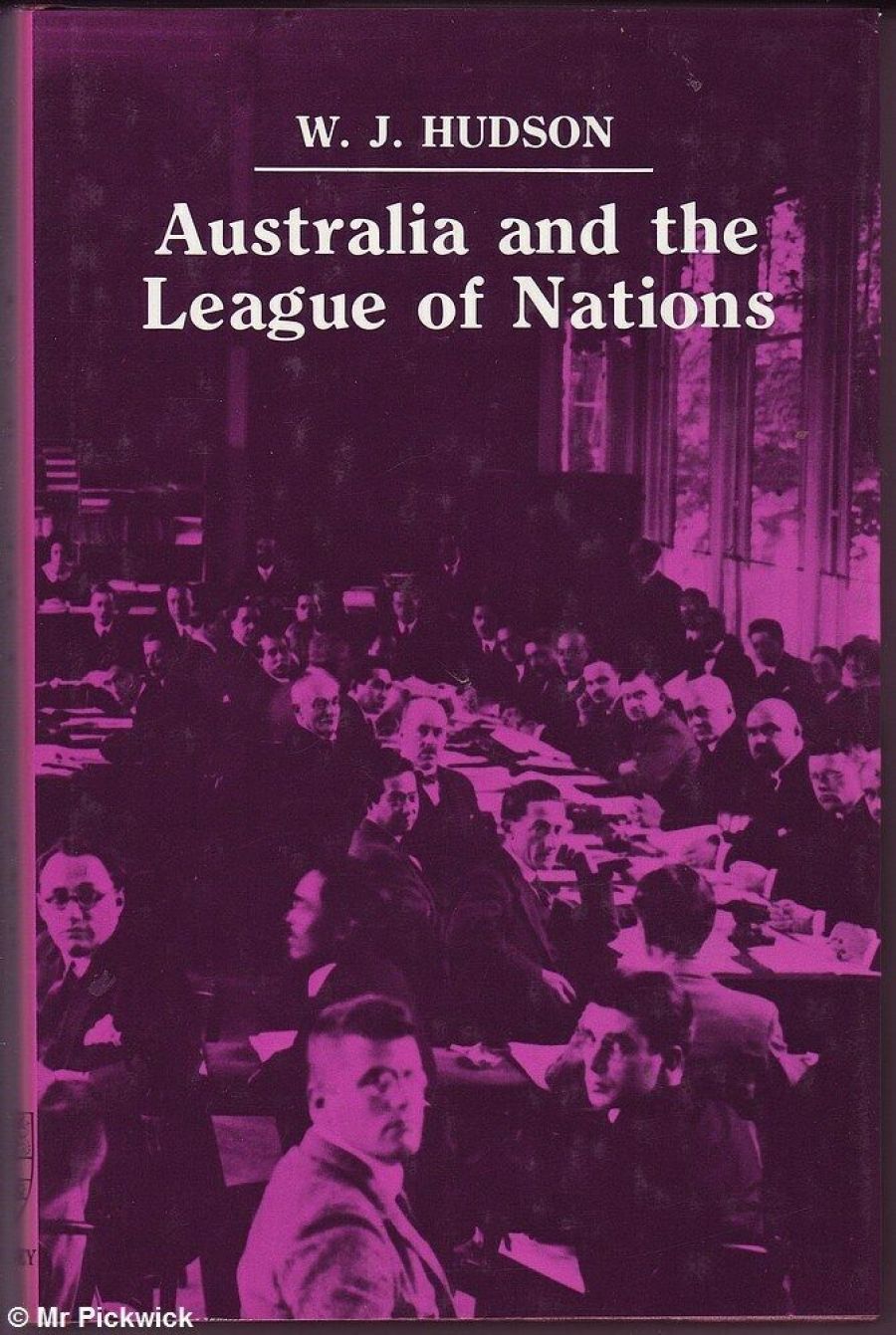
- Free Article: No
- Contents Category: International Studies
- Review Article: Yes
- Article Title: Australia in the Big League
- Online Only: No
- Custom Highlight Text:
Dr Hudson, who is now editor of historical documents in the Department of Foreign Affairs, has written a very useful study of Australia’s involvement in the League of Nations. A sometime journalist, Hudson has an enviable flair for writing about complex international issues in a manner comprehensive to an undergraduate or to that gentleman beloved of publishers’ blurbs, the intelligent layman. This book is further evidence that a scholarly work can be both brief and readable.
- Book 1 Title: Australia and The League of Nations
- Book 1 Biblio: S.U.P $22.50, 224 p, index, biblio, IBSN 0 424 00084 9
- Book 1 Cover Small (400 x 600):

- Book 1 Cover (800 x 1200):

He apologises in his Introduction that the book is ‘institutional’ and ‘less vital than one might wish’. To the extent that this is warranted, it is a reflection of the subject and not the treatment. Hudson has sensibly adopted an approach that is as much thematic as chronological, which makes it easier for the reader to pick his way through the intricacies of quasi-legal argument about the meaning of this or that Article of the League Covenant.
Two themes stand out as being of the widest general interest. The first is Hudson’s contribution to the longstanding debate over whether Australia had a foreign policy before she established a foreign office and diplomatic service in the late 1930s and early 1940s. It is now generally accepted that there was something worthy of that description long before Dr Evatt’s arrival in federal politics, but precisely what should be included under this rubric is still open to argument.
The problem lies in what Hudson calls ‘the mess’ caused by dominion status, which meant that Australia could assert one day that she was an independent actor in world affairs, and the next that she was merely a constituent part of the British Empire. Given this ambiguous status, Australia’s independent membership of the League of Nations was significant. The League offered Australia ‘a gentle introduction into world politics’, wherein the tiny handful of ministers and officials concerned with Australia’s external relations could begin to learn some of the complexities of international diplomacy. They could and did make mistakes with relative impunity. After reading Hudson’s account of the diplomacy of Sir Joseph Cook, it is sobering to reflect that former ministers are still being appointed to the High Commission in London and other sensitive diplomatic posts.
The point Hudson emphasises is that I Cook and other Australian representatives at Geneva were pursuing Australian policies, however clumsily. Sir Littleton Groom, for example, played a noteworthy part in the discussion of the ill-fated Geneva Protocol of 1924 his interventions being primarily motivated by concern for the White Australia policy. it was mainly this concern that gave what consistency there was to Australian activities in the international arena. Beyond immigration, Australian policies were generally either passive or sporadic. Hudson has done much to expand our knowledge of the range of Australian . activities, but his claim that Australia had ‘coherent, continuing policies’ still needs to be taken with a little caution. Uncertainty, inconsistency and acceptance that Whitehall knew best were all characteristic of the interwar period.
The other main theme is the importance of S.M. Bruce as Australia’s principal spokesman in League councils in the 1930s. Bruce’s work in London and Geneva has deservedly received more sympathetic attention from Australian historians in recent years. His concerns were more distinctively, sometimes aggressively, Australian than his image of the spats-wearing ‘Englishman born in Australia’ would suggest: yet so much of what he did was carried out on his own initiative, without ever being reported to Australia afterwards, that it is by no means easy at times to say what should be classified as Australian foreign policy and what was the foreign policy of S.M. Bruce, an independent actor in imperial and world politics. Hudson’s special contribution in this book is to note the importance of Bruce’s collaboration with F.L. McDougall, ‘perhaps the most underestimated man in twentieth-century Australian history’. Their efforts led, inter alia, to the foundation of the Food and Agriculture Organisation of the United Nations. There are clearly more veins to be mined in the early history of Australian foreign policy, as Hudson and others broaden our interpretation of what ‘foreign policy’ includes.
The book is well produced, apart from some minor typographical errors. Footnotes at the bottom of the page these days deserve special attention.


Comments powered by CComment